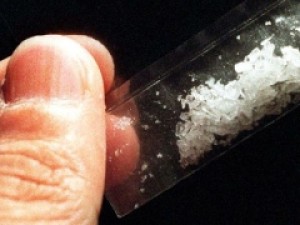MANILA, Philippines—More than P3 billion worth of “shabu” (methamphetamine hydrochloride), and raw materials and equipment for the manufacture of illegal drugs were seized during a raid on a laboratory disguised as a plastics factory in Camiling Tarlac on Thursday, according to the National Bureau of Investigation.
Six Chinese men were also arrested during the raid on the laboratory that measured more than a hectare and the warehouse that was secured with closed circuit television and other high-end security gadgets.
Eric Isidoro, the head of the NBI’s antidrug unit, said that among the items recovered were large tubes and cooking equipment classified as for “industrial use” and millions of pesos worth of chemicals used as ingredients for the manufacture of illegal drugs.
Based on the size and volume of the chemicals and the records seized from the high-fenced concrete warehouse, the laboratory, considered to have biggest shabu laboratory in the country, could have been producing very large numbers of shabu, as much as 100 kilograms a day, Isidoro said.
Finished product
He said that while only 17 kgs of “finished shabu products” were seized from the laboratory, the raw materials found in the area would yield at least P3 billion worth of finished product, he said.
Isidoro said the six arrested Chinese, who have not yet been identified, are facing charges of violating Republic Act No. 9165, or the Comprehensive Dangerous Drugs Act of 2002, particularly the provision on the manufacture of illegal drugs.
He said the illegal drugs syndicate operating in the laboratory had used “a modified ingredients to lower the odor while cooking the illegal substance to avoid suspicion.”
“The laboratory was in the middle of a residential area but nobody suspected it to be a shabu laboratory because there was no smell and the plants nearby did not wilt,” the NBI agent said.
Mayor’s neighbor
Isidoro observed out that the laboratory was not too far from the house of Camiling Mayor Neil Agustin.
He clarified, however, that Agustin was not a suspect in the case.
According to Isidoro, as early as August his unit had received a tip from an informant about a big shipment of “shabu precursor” having arrived in the country, imported by Chinese nationals.
“Based on that information we followed the trail and finally we established that the Chinese were building an illegal drugs laboratory in Camiling, Tarlac,” Isidoro said.
Had the new laboratory not been shut down, it would have flooded the Asian market with an oversupply of shabu that would bring down the street price from P3 million to P700 thousand.
The agent said that based on the town’s records the warehouse was listed under the name of a Conde Sy who bought it from a farmer’s cooperative.
He said that Sy would be invited by the NBI for more information about his tenants.
Under surveillance
Isidoro said the area around the laboratory had been under surveillance for two months before the NBI conducted the raid that was authorized by a search warrant issued by the a Manila court.
He said Philippine Drug Enforcement Agency (PDEA) will have custody of all the evidence, including the confiscated drugs and equipment.
“The NBI does not have the facility to keep the evidence,” the NBI agent said.
Following the bust of what is considered the biggest shabu laboratory in the country, the government is expected to undertake more antidrug operations in a bid to quash the illegal drugs industry, Justice Secretary Leila de Lima said yesterday.
De Lima, who has just returned from an official trip to Europe, met yesterday with the NBI team that led the raid on Thursday.
The operation yielded P3 billion in equipment, raw materials, and at least 15 kilos of shabu (methamphetamine hydrochloride) from the drug laboratory.
“Oh yes, definitely (there will be more). We are now assessing how big this bust is,” De Lima told reporters on Friday.
Working double time
“Our authorities do not stop in conducting anti-drug operations. Of course, our lead agency is always the PDEA, and the PNP and the NBI have their own antidrug units. All of these units are really working double time to intensify antidrug efforts,” she added.
The Intelligence Service of Armed Forces of the Philippines (Isafp) and PDEA joined forces with the NBI in the Thursday raid.
De Lima said she was privy to the raid, particularly during the planning stage that started “several weeks ago.”
“We hope that this will deal a big blow to the illegal drugs industry in the Philippines. We really need intensified efforts to fight illegal drugs in the country, especially since the elections are approaching. Narcopolitics might again proliferate,” she said.
